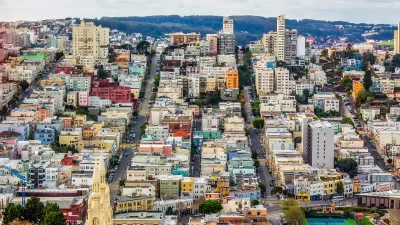Twitter’s move into San Francisco this month is part of a new trend of tech companies setting up in the city, causing rents to skyrocket, and forcing lower-income residents out.
A different kind of gold rush is hitting San Francisco. But instead of golden nuggets, entrepreneurs are looking for office space.
Norimitsu Onishi reports that tech companies, such as Twitter, are repositioning their headquarters in the middle of the city, bringing with them jobs and gentrification. But the pull away from Silicon Valley brings young workers along with it, raising residential rents and putting at risk, "the very qualities that have drawn generations of outsiders here, like the city's diversity and creativity. Families, black residents, artists and others will increasingly be forced across the bridge to Oakland, they [critics] warn."
"If you have a city that is wall to wall with tech workers, that might be really cool from a tech worker's standpoint," said Peter Cohen, director of the San Francisco Council of Community Housing Organizations, a private group representing nonprofit housing developers. "But that is not the kind of rich diversity of population that makes San Francisco the place that it is."
While Mayor Edwin Lee, who has aggressively courted the start-ups, "recently proposed creating a housing trust to finance affordable housing for the next thee [sic] decades,...It is not clear whether the trust - which must be approved by the Board of Supervisors and voters in a vote in November - will become reality, much less what effect it will have over decades."
Thanks to Akemi Leung
FULL STORY: New San Francisco Tech Boom Brings Jobs but Also Worries

Alabama: Trump Terminates Settlements for Black Communities Harmed By Raw Sewage
Trump deemed the landmark civil rights agreement “illegal DEI and environmental justice policy.”

Study: Maui’s Plan to Convert Vacation Rentals to Long-Term Housing Could Cause Nearly $1 Billion Economic Loss
The plan would reduce visitor accommodation by 25% resulting in 1,900 jobs lost.

Why Should We Subsidize Public Transportation?
Many public transit agencies face financial stress due to rising costs, declining fare revenue, and declining subsidies. Transit advocates must provide a strong business case for increasing public transit funding.

Wind Energy on the Rise Despite Federal Policy Reversal
The Trump administration is revoking federal support for renewable energy, but demand for new projects continues unabated.

Passengers Flock to Caltrain After Electrification
The new electric trains are running faster and more reliably, leading to strong ridership growth on the Bay Area rail system.

Texas Churches Rally Behind ‘Yes in God’s Back Yard’ Legislation
Religious leaders want the state to reduce zoning regulations to streamline leasing church-owned land to housing developers.
Urban Design for Planners 1: Software Tools
This six-course series explores essential urban design concepts using open source software and equips planners with the tools they need to participate fully in the urban design process.
Planning for Universal Design
Learn the tools for implementing Universal Design in planning regulations.
Caltrans
Smith Gee Studio
Institute for Housing and Urban Development Studies (IHS)
City of Grandview
Harvard GSD Executive Education
Toledo-Lucas County Plan Commissions
Salt Lake City
NYU Wagner Graduate School of Public Service





























